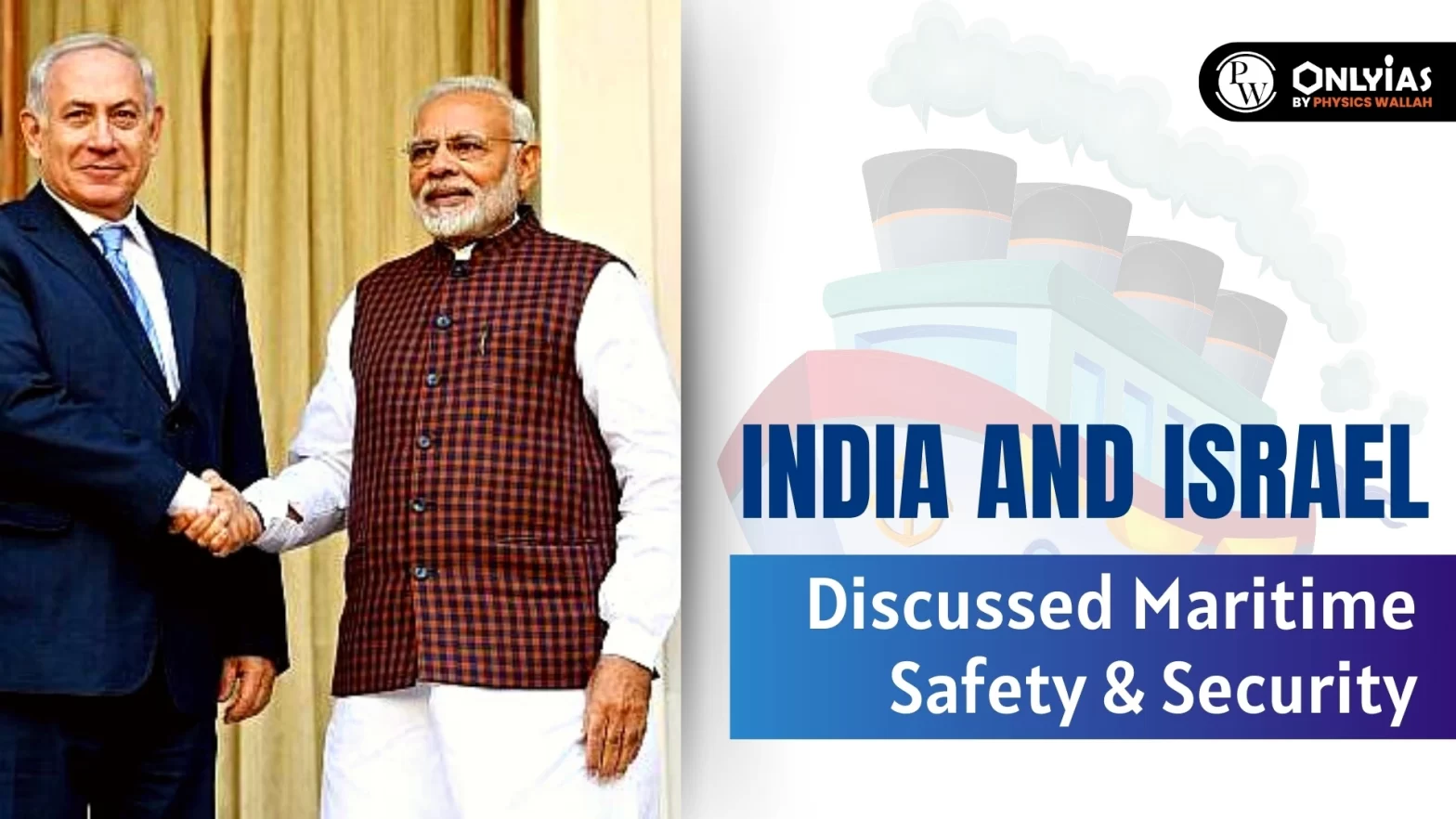Context: This article is based on an Editorial “Modi and Netanyahu discuss Israel-Hamas conflict and maritime security” which was published in the Live Mint. Recently, India and Israel discussed the escalating threats to maritime safety & security in the Red Sea region following the actions of Houthi militants of Yemen.
| Relevancy for Prelims: Bab-el-Mandeb Strait, Operation Prosperity Guardian and Colombo Security Conclave.
Relevancy for Mains: Significance and Challenges of Maritime Security for India, Associated initiatives of the Government and Way Forward. |
Recently taken Actions for the Maritime Safety & Security
- Freedom of Navigation: India and Israel discussed the freedom of navigation for ships going through the Bab-el-Mandeb strait, which faced a threat from Houthi militants of Yemen.
- The Bab-el-Mandeb Strait connects the Mediterranean Sea and the Indian Ocean and is an important link for India’s trade with the Middle East, Africa and Europe.
- Operation Prosperity Guardian: It is a multinational security initiative launched by the US to counter the growing number of attacks against Israel-bound international traffic.
- Coalition includes the U.K., Bahrain, Canada, France, Italy, the Netherlands, Norway, Spain, and Seychelles, apart from the U.S.
Continue Reading: PM Modi And Israeli PM Netanyahu Discuss Maritime Safety
India’s Maritime Safety & Security: Significance
- Long Coastline: Maritime security is important as it has a coastline of over 7,000 km.
- Critical Infrastructure: Critical infrastructure in the maritime domain facilitates the continuous delivery of basic services such as energy and communication, particularly the Internet.
- Maritime Trade: Securing Sea Lanes of Communication (SLOCs) is important for maritime trade.
- Geopolitical and Geostrategic Consideration: As China is strengthening its presence in the Indian Ocean region with its String of Pearl theory such as the Hambantota port in Sri Lanka.
- Exclusive Economic Zone (EEZ): India enjoys an EEZ of around 2.37 million sq. km.
- Blue Crime: This includes piracy in regions such as the Gulf of Guinea and Strait of Malacca, smuggling of illicit goods and people, such as narcotic trade in the Mediterranean region.
- Unconventional Issues: Other concerns include robbery, illegal trafficking of goods and people, illegal fishing and pollution and environmental issues like fishing and marine pollution.
- Environmental Issues: Unrestricted fishing methods, shipping pollution, and waste disposal at sea have deteriorated marine ecosystems and reduced fisheries.
India’s Maritime Safety & Security: Mechanism
- Patrolling of IMBL: The Indian Navy patrols the International Maritime Boundary Line (IMBL) and the Indian Coast Guard (ICG) is mandated to patrol and surveillance up to 200 nautical miles.
- Patrolling in Shallow Coastal Areas: The State Coastal/Marine Police (SC/MP) performs boat patrolling in shallow coastal areas.
- Patrolling of Creek Areas: The Border Security Force (BSF) is deployed in the creek areas of Gujarat and Sundarbans in West Bengal.
India’s Maritime Safety & Security: Challenges
- Overlapping Jurisdictions: The patrolling and surveillance duties are overlapping of duties of law and order (State List) with maritime border guarding (Union List).
- Less Coordination between Navy and ICG: As the Navy is under the Department of Military Affairs and the Indian Coast Guard (ICG) was placed under the Ministry of Defence.
- Security of Maritime Borders is not ICG’s Primary Duty: As ICG was set up primarily for policing and general superintendence of maritime areas.
- Threats to the Sea Lines of Communication (SLOCs): It is due to piracy, drug trafficking, human smuggling, pollution, accidents, mines, closure of choke points, inter-state conflicts. etc..
- Infrastructure Constraints: There are various infrastructure constraints too.
India’s Maritime Safety & Security: Initiatives
- SAGAR Vision (Security and Growth for all in the Region) for safeguarding maritime interests.
- Indo-Pacific Oceans Initiative to ensure security and stability of the regional maritime domain.
- The Information Fusion Centre-Indian Ocean Region is a regional maritime security center.
- Indo-Pacific Partnership for Maritime Domain Awareness initiative to enhance maritime domain awareness in the Indo-Pacific region.
- Shared Awareness and Deconfliction (SHADE) program for information exchange with other maritime forces.
- Colombo Security Conclave that includes India, Sri Lanka, Mauritius and the Maldives for ensuring the security and stability of the Indian Ocean region.
Way Forward to the Maritime Safety & Security
- Need for Separate Maritime Guarding Force under the administrative control of the Ministry of Home Affairs.
- Need for UN Structure for Maritime Security to regulate issues related to maritime security.
- Issue Specific Grouping can help in better reforming the current coordination issues.
- Innovative Techniques for Maritime Security such as satellite and unmanned aerial vehicles.
Conclusion:
Addressing the challenges and enhancing initiatives in maritime safety & security is crucial for India, as seen in discussions with Israel, and requires a multi-faceted approach involving regional cooperation, organizational restructuring, and technological innovation.
Must Read: India-Israel Bilateral Relations
![]() 21 Dec 2023
21 Dec 2023

